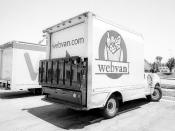Abstract
Both Amazon and Webvan were well-funded Internet startups in the 1990's. Both focused on a business model that allowed consumers to order products online that would be delivered to the consumers home. In the article, we discuss why Amazon succeeded while Webvan failed.
The Two Companies' Background
Amazon: Amazon.com, Inc. Amazon.com, Inc. is a Website where customers can find and discover anything they may want to buy online. Jeff Bezos founded Amazon .com in 1990and in July 1995, Amazon.com, Inc. the Fortune 500 Company commenced its operations becoming one of the world most customer-centric company, and selling Worlds Biggest Selection. They offer their customers the lowest possible prices and highest quality. They sell millions of unique, new, used and collectible items in categories such as apparel and accessories, electronics, computers, kitchen and house wares, books, music, DVDs, videos, cameras and photo items, office products, toys, baby items and baby registry, software, computer and video games, cell phones and service, tools and hardware, travel services, magazine subscriptions and outdoor living items.
The Company organized its operations into four principal segments. 1. North America Books, Music and DVD/Video (BMVD); 2. North America Electronics, Tools and Kitchen (ETK); 3. International, 4. Services
Webvan: Webvan was started in 1996 by Louis Borders and was established to sell groceries over the World Wide Web. George Shaheen resigned as CEO of Anderson Consulting to take advantage of the opportunity to become CEO of Webvan. Webvan, which originated as an online grocery service, delivers food (including its BestYet label, a co-brand with food distributor Fleming Companies) and non-prescription drugs to their customers' doors. Webvan's vision was to provide grocery-shopping solutions that would save consumers both time and effort, without sacrificing the quality, selection, and low prices of traditional brick-and-mortar stores.
Why Amazon...


